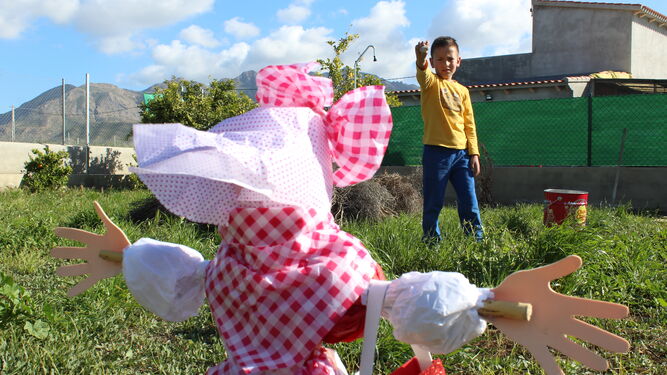Halfway through Lent, a peculiar festival is celebrated here and there known as the Día de la Vieja or the day of La Vieja Remolona. It is actually a fiesta from Aragón but for some reason a granny has been substituted from a grandad (the Aragonese version) and it is celebrated in the pueblos of the east of Almería - always on a Thursday. This year (2023!) it fell on March 16th.
Even though it is not an official holiday, if you don’t go to school or to work then no one seems to mind.
The history of La Vieja goes back a long time to when the children needed a break from the rigours of Lent, getting a day off. The whole family trudges up the mountain and has a picnic which includes special breads and pastries made for the occasion. They enjoy twisted breads with hard boiled egg inside and chicherones (pork rind) which I think are as bad as they sound, but on this special day they sell like hot cakes. The children in the villages from our corner of Almería make a paper doll on a cross and, after the picnic lunch in the campo is over, throw rocks at it. 
The head is full of candy resembling the Mexican piñata. Any reason to have a fiesta, hey?
The historians think that some Franciscan monks moved into Eastern Almería following the reconquest in the late fifteenth century to clean the place up, introduce their own traditions and put a crucifix over every hearth. Perhaps they came from Zaragoza.
Like many other innocent children's festivals today, there's a expurgated story behind (you should see what they've done to the carnavales, dropping the disguises as an excuse for anonymous sex, frolic and bacchanalia in favour of a kiddies dress-up; or consider the sinister Ring-a-Ring-of-Rosies song in reference to the Great London Plague of 1665). Thus the Día de La Vieja sounds like there is a creepy version lurking in our unwritten history - perhaps where they took those too old and feeble to work out to the campo for lunch, only to be, ah, left there. Perhaps that's just me being cynical.
There's another even odder version from Madrid. Up until the late seventeen hundreds, a seven-legged granny (sic) would be hanged by a rope in the Plaza Mayor as the cuaresma - the forty days of Lent - began. She had been made from straw on Ash Wednesday and she was revered as the Queen of Lent. Each week, one of her seven limbs was cut off, to record for the citizens how many weeks of fasting remained. It is told that halfway through Lent, on a particular Thursday, the youths of Madrid, tired of the endless gloom, would celebrate with a botellón while running throgh the streeets looking for any old woman to beat with sticks. '¡Muera la vieja!', they would shout.
Around here, following after every merrie holiday comes El Día de la Resaca (hang-over day, groan), like La Vieja it is not an official holiday but you don’t get in trouble for not showing up for work or school. Well, I may be a bit out of date on that one, but it has always served around here as an excuse for absence from one's post...
The old folk (the surviving ones) recall that around fifty years ago, the children would go door to door asking for food for the Vieja picnic and if they did not get any they would play a nasty trick on the home-owner.
Here’s a song the kids in Aragón sing, threatening those neighbours who won’t give them sweets with a stone through their window (come to think of it, the original ‘trick or treat’):
O viejo remolón
Que no quié comer pan,
Sólo chulleta y huevos
Y chocolate si le dan
The lazy old grand-dad won’t eat any bread; only meat and eggs, and chocolate if you give him any.
Time to bash his head in with a handy rock, perhaps?